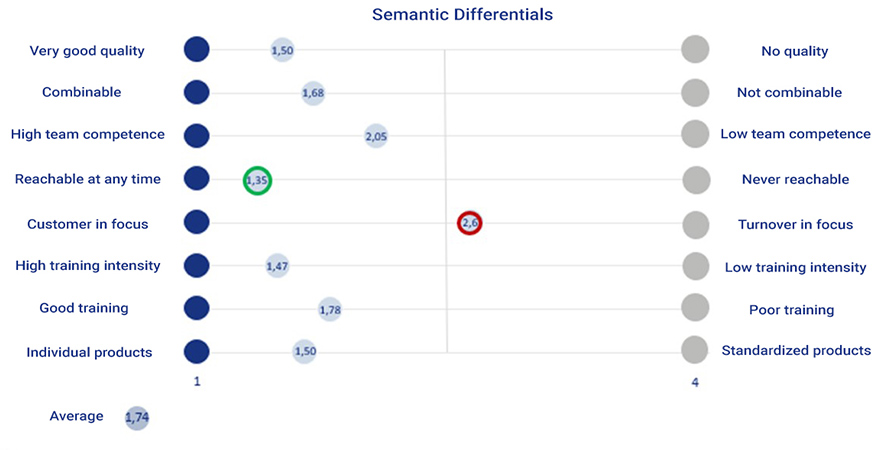
The informed applicant: Why having a digital external perception is becoming increasingly important for companies
The assumption that applicants are a kind of supplicant for companies is outdated. Well-educated applicants choose their future employers. But what if a company's digital footprint can leave something to be desired?
If you look at the baby boomer generation, the concept of work as a means to an end stood in the foreground. Work was romanticized as a kind of promise of advancement, a vehicle to prosperity. The concept of work today, however, is no longer solely shaped by hygiene factors such as monetary compensation.
The Changing Concept of Work
Today, the focus is clearly more on giving meaning to work, as well as the endeavor of adapting, respectively, integrating working life into life outside the job. The (increased) demands of employees have largely replaced the Taylorism from the turn of the century, which defined people as a resource for performing effective (assembly line) work. Instead of rigid and authoritarian structural specifications, factors such as cooperation, meaningfulness, work-life balance and agility increasingly count.
Today, typical aspects of discussion are:
- What occupational health management factors does the employer offer?
- Can employees work from home?
- What meaning can this type of work provide?
- What is the management style and corporate culture like?
- What are the office spaces like? What type of environment are the offices located?
- How much room for development is offered?
Companies must have an answer to these factors and be able to deal intensively with these points, as these aspects inevitably take on a practical character when they are discussed on rating portals, in comments as well as in forum posts and are thus how companies are commonly rated. Portals such as Kununu or Indeed become a significant factor, since a poor ranking nowadays has an explicit impact on potential applicants - and thus also on the company.
Can an industrial company present itself as open and employee-friendly? The internet community is as honest as it is merciless here; after all, it is customary for employees to be able to submit anonymous evaluations. While "the satisfied or indifferent" are usually silent, it is primarily the critical voices that become visible on those platforms. Here, a potential applicant can obtain information to get an impression. The aspects described here do not have to be taken one-to-one from reality, but a second look is useful if certain things are increasingly voiced. Is every second comment aimed at incompetent leadership? The salary is below average? The tasks are perceived as boring? These are all warning signs that can get a company into serious trouble - especially if these aspects are increasingly and commonly criticized.
Measures from the Company’s Side
The question that arises is: What can a company do? Openness is certainly an important key here. Obstacles to openness include, for example, a pronounced buddy culture, an outdated, male-dominated workforce, as well as mindsets such as: "We've always done it this way" are a hindrance to improving things.
It is therefore important to implement a culture of error. "Social Washing", i.e. putting the company in a communicatively positive light in any and every case, is never a solution because the management is then disconnected from the perception of the workforce and may receive the receipt via bad comments and ratings. This is especially precarious if the industry is highly competitive, but very short of personnel. A potential applicant will then already decide per se in favor of the better rated company or will not even apply to company "Xy".
As a rule, the applicant will come to the interview with a backpack full of information. He will have looked at salary lists, competitor companies and all of the additional benefits that are becoming increasingly important. If the company performs poorly against those factors, the application will fail to materialize.
Therefore, for success, the following applies:
- Openness
- Regular employee appraisals
- Error culture (not only good on paper)
- Reflection of values (internal and external)
Analysis Tools from External Service Providers
A common method in which DTO can support you, an industrial company, is the image analysis tool (Image-Analysis: https://dto-research.com/en/current/professional-articles/391-the-image-analysis-why-it-is-important-for-companies-to-address-their-brand-s-self-image-and-external-image). Every company communicates its own value culture and puts it into practice in different ways. Therefore, it is important to check whether values such as tolerance, reliability or even high quality are perceived and lived by the workforce (internal) or stakeholders such as users of certain products (external) in a similar way as intended by the company management. The following graphic shows a comparison of pairs of opposites on a scale of 1-4. Here, the products offered by a company were evaluated by external stakeholders.

Semantic differential according to DTO (2021)
Other applications that are increasingly in demand are salary analyses and various forms of "social media screening". Here, clients tend to be interested primarily in the competitive environment.
Screening Options (among others):
- Average salaries by job and industry
- Benefits offered
- Social media activities
DTO acts as a corrective here, so that you can better position yourself to optimally adjust to fit the needs of talents and applicants..
Are you a decision-maker in an industrial company and want to know what drives potential applicants? Do you want to know how you compare to other companies in the industry in terms of salary, social media activity and benefits? Then feel free to contact us at DTO for a non-binding consultation!
Text written by Kai Wichelmann